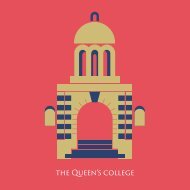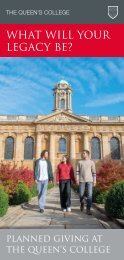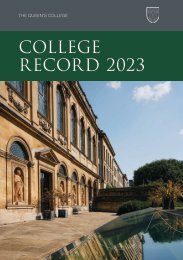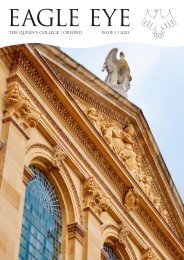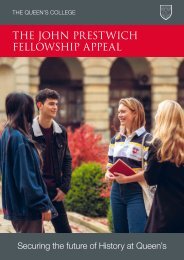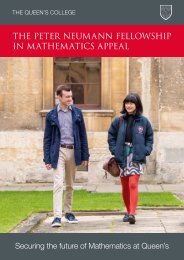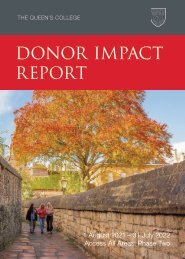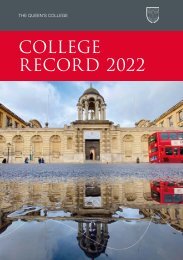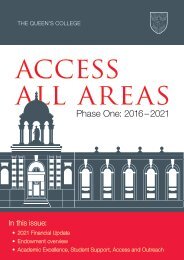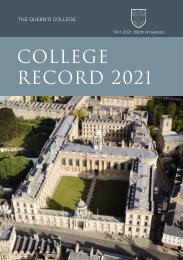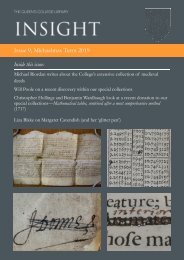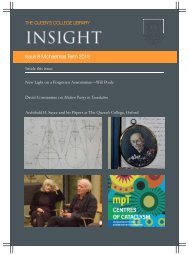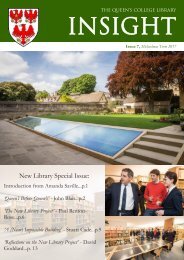The Queen's College Record 2020
Create successful ePaper yourself
Turn your PDF publications into a flip-book with our unique Google optimized e-Paper software.
Reports and <strong>College</strong> Activities<br />
CENTRE FOR MANUSCRIPT AND TEXT<br />
CULTURES<br />
Dirk Meyer<br />
Fellow in Chinese and<br />
Director of CMTC<br />
Thanks to generous support from the <strong>College</strong>, the Centre<br />
for Manuscript and Text Cultures (CMTC) was launched<br />
in the academic year of 2018-19 as an inter- and crossdisciplinary<br />
research centre for the study of material text<br />
cultures and their written artefacts. <strong>The</strong> Centre builds<br />
on, and substantially expands – methodologically and<br />
in scope – the activities of the Workshop for Manuscript<br />
and Text Cultures (WMTC), which has been running<br />
successfully in the <strong>College</strong> since 2012. <strong>The</strong> members of<br />
Queen’s involved the organisation of the Centre are John<br />
Baines (Egyptology), Angus Bowie (Classics), Charles<br />
Crowther (Ancient History), Fabienne Heuzé (Sanskrit,<br />
John P. Clay Scholar), Christopher Metcalf (Classics), Dirk<br />
Meyer (Chinese Philosophy), Selena Wisnom (Sumerian<br />
and Akkadian); but we had much help, technical and<br />
otherwise, from colleagues in Oxford and elsewhere.<br />
‘Manuscript and Text Cultures’ describes a phenomenon that begins when written<br />
documents start to circulate more widely and knowledge transmission becomes<br />
increasingly text-centred and no longer a predominantly oral exercise. <strong>The</strong> Centre<br />
offers a platform for both established scholars and research students engaged in<br />
the recovery, decipherment and interpretation of texts from a broad range of premodern<br />
cultures across the globe in which this phenomenon can be observed. Our<br />
activities are designed to enable scholars to share their experiences and develop new,<br />
collaborative research topics across disciplinary boundaries. <strong>The</strong> Centre combines<br />
traditional approaches, such as philology, epigraphy and papyrology, with new<br />
methodologies inspired by communication theory, information science, philosophy,<br />
and other disciplines, so as to generate a common language for the study of the<br />
material conditions of meaning production and memory across time and space. Its<br />
interdisciplinary approach sets out to drive our understanding of processes underlying<br />
human creation of knowledge and meaning in new ways with clarity and rigour. In<br />
this way the Centre hopes to enable informed debate across subject boundaries<br />
and to contribute to shaping an emerging field of enquiry into the material factors of<br />
knowledge production in literate societies.<br />
56 <strong>The</strong> Queen’s <strong>College</strong> | <strong>College</strong> <strong>Record</strong> <strong>2020</strong>




